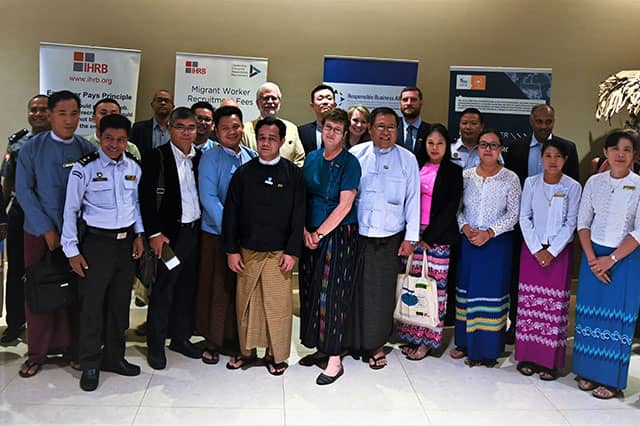Promoting Ethical Recruitment of Myanmar Migrant Workers

On 15 May 2019, a Regional Roundtable on Driving Responsible Recruitment in Asia, at Novotel Yangon was organised by MCRB, together with its co-founder, the Institute for Human Rights and Business (IHRB)’s Leadership Group for Responsible Recruitment, the Consumer Goods Forum (CGF) (which brings together the CEOs and senior management of some 400 retailers, manufacturers, service providers, and other stakeholders across 70 countries) the multistakeholder Responsible Labor Initiative, and the International Tourism Partnership.
The Leadership Group convened by IHRB brings together major global brands committed to The Employer Pays Principle: No worker should pay for a job, i.e. the costs of recruitment should be borne not by the worker but by the employer. The Group includes The Coca Cola Company, GE, Ikea, Hewlett Packard Enterprise, HP Inc., M&S, Mars, Nestlé, Nike, Target, Tesco, Unilever, Vinci and Walmart, many of whom attended the Yangon meeting.
This meeting built on regional roundtables and governmental dialogues in 2018 in Thailand and Malaysia, and offered the opportunity for brands, suppliers and recruitment agencies to come together for constructive discussions on transitioning to responsible recruitment based on the Dhaka Principles on Migration with Dignity (available in EN and MM) and CGF Priority Industry Principles which state that:
-
Every worker should have freedom of movement. The ability of workers to move freely should not be inhibited by their employer
-
No worker should pay for a job. Fees and costs associated with recruitment and employment should be paid by the employer.
-
No worker should be indebted or coerced to work.
Around 110 participants attended on 15 May for a full day of discussion. These included members of the Myanmar Overseas Employment Agencies Federation which brings together 270 Myanmar recruitment companies (200 of which have committed to a Code of Conduct which was developed with the ILO, with trade union input), multinational brands whose operations and supply chains employ Myanmar migrant workers, particularly in Thailand, trade unions and migrant worker rights NGOs, such as Issara Institute, and CSOs, international organisations including the International Labour Organisation (ILO) and the International Organisation for Migration (IOM), and
The Myanmar Roundtable explored the key challenges for Myanmar as a major origin country for migrant workers across South East Asia, and brought expert input and practical learnings from those directly engaged at all stages of the recruitment cycle. It was an opportunity to for participants from Myanmar to understand more about the key local and international drivers of change in the recruitment industry and to discuss both the roadblocks and the opportunities in shifting to an ethical recruitment model. Myanmar overseas recruitment agencies presented on the Code of Conduct, and discussed the challenges they faced, with Thai employers and the Myanmar and Thai governments. (The two governments first signed a memorandum of understanding (MOU) on employment in 2003 which became active in 2009 and was revised in 2016 but still has weaknesses).
The findings of a recent study were highlighted which showed that regular (i.e. legal) migration under the MoU took 114 days and resulted in costs to the worker of around $501 compared to irregular which took 33 days and cost $215. 52% of workers under formal channels had experienced problems, compared to only 48% migrating informally. This underlined the need to make further changes to improve formal recruitment channels so that workers would use them, and learn from informal ones.
The presentation from Issara Institute was particularly valuable to ensure that the ‘worker’s voice’ was represented. Their 2018 report:
contains a detailed analysis of current formal and informal migration routes, and identifies eight challenges, on which they make recommendations, some of which involve multistakeholder dialogue of the sort this Roundtable in Yangon provided, including the participation of international brands.
Following the multistakeholder meeting on 15 May, a half-day meeting was held on 17 May with government officials involved in migrant labour administration from Ministries of Labour Immigration and Population; Social Welfare, Relief and Resettlement; Health; General Administration Department; Ministry of Foreign Affairs; Union Attorney-General’s Office; Central Bank and the Police. This was an opportunity both to feed back messages from brands and other business stakeholders and to hear the Government’s main challenges and activities in implementing their recently adopted second five-year Plan of Action, which was put together with support from IOM, ILO and Issara, inter alia and launched on 13 May.
 English
English မြန်မာ
မြန်မာ မြန်မာ (unicode)
မြန်မာ (unicode)








